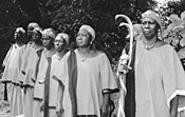The setting is a peaceful village in Burkina Faso, where neat mud huts stand in beautiful relief against a blazing blue sky. Women in bright fabrics move about, carrying buckets or baskets of eggs, while somewhere a radio plays a line of soft music. The mood is easy but lively, and when a traveling merchant comes to town -- he is known as Mercenaire -- the villagers are pleased and amused. He's got a wagon full of Technicolor temptations (from painted tea kettles to Western women's underwear), but most of the women want batteries. After all, they've got to keep their radios running.
Conflict erupts when four young girls run to the doorstep of Collé (Fatoumata Coulibaly) and ask for moolaadé, a form of protection. The girls are fleeing "purification," the ritual circumcision that every female child in the village undergoes, and Collé is their only hope. Seven years earlier, Collé refused to allow her daughter to be cut -- an act of defiance that shook the village and still, we soon see, haunts its populace. Collé grants the young girls moolaadé, drawing a rope across the entryway to her compound. The girls are forbidden to cross it, and members of the community are forbidden to remove the girls from Collé's care.
After this decisive gesture, the movie delves deeply into the conflict over female circumcision. Initially, it's a women's issue, in which the salindana -- the female elders responsible for performing the circumcisions (and, in doing so, carrying on what is seen as a critical tradition) -- demand that Collé release the children. When she won't, the salindana seek help from the governing council of male elders. They can't force Collé to recant (the moolaadé is a spiritual invocation with its own set of rules), but they can shame her husband, advising him to flog her in the public square until she utters the release word. In the meantime, the men confiscate all of the radios, convinced that it's the pernicious influence of the city that has loosened the morals of their women.
This tug-of-war is the central conflict, but a lot more happens on the sidelines. Like Collé -- a deep character, with a bright spirit and a sharp wit -- the film takes a vehement stand against female circumcision, a position that is impossible to contest, at least with Western eyes. Dramatically, this could have been a mistake, but Sembene is so careful to express the humanity of his characters, and so good at showing us how his village functions, that we accept an entirely different set of traditions and mores not as the Evil Other but as the given.


